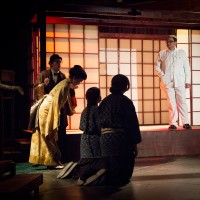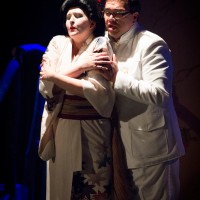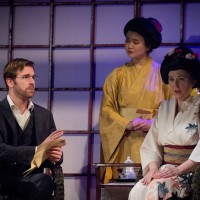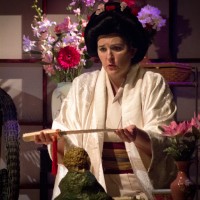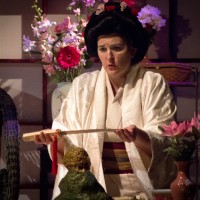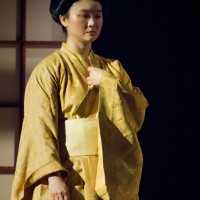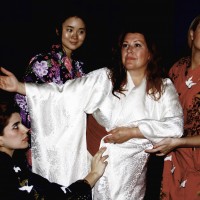CLO’s “Madama Butterfly” flies on the wings of Svedaite’s title role
By Milton Moore
Published May 17. 2014 4:00AM Updated May 17. 2014 5:47PM
New London — Of the Big Three Puccini operas — “Tosca,” “La Boheme” and “Madama Butterfly” — “Butterfly” is the most perilous and the least performed, despite its wonderful score. The reason is simple: Few operas rely more heavily on a single performer.But Friday evening at the Garde Arts Center, the Connecticut Lyric Opera staged a most satisfying, and at times deeply moving, “Madama Butterfly,” thanks largely to that single performer: soprano Jurate Svedaite in the title role of the child bride Cio-Cio San.Cio-Cio San is a long and testing vocal role that many great singers have avoided until late in their careers. This role is definitely not child’s play, which can create something of a disconnect with the character’s stage presence, since Cio-Cio San starts as a 15-year-old and “ages” into an 18-year-old. That ever-present dramatic hazard, long stretches of static stage blocking and Act 1 technical difficulties with the super titles were all flaws easily overcome Friday by Svedaite’s assured and powerful vocal performance.The company’s prima donna for its full 11 seasons here, Svedaite has delighted audiences in many of opera’s leading roles, but few as unrelenting. The best qualities of her voice were showcased in the opera’s showstopper, the Act 2 “Un bel di,” Cio-Cio San’s tragically resolute prediction of the joys of the return of the American sailor who loved her and sailed away. In the aria, her remarkable evenness of power and character throughout her wide range, in full voice and half, was in full display. Hers is a beautiful instrument, never hooty at the top or dropping to inaudible at the bottom, and it carried the 2½-hour production.Her co-star, as has been the case throughout the CLO’s remarkable growth to becoming the leading state opera, was artistic director and conductor Adrian Sylveen and the 28-piece Connecticut Virtuosi Orchestra. The orchestra was especially nuanced in the delicate interplay of winds and pizzicato strings of the Act 2 letter scene, where company baritone Luke Scott as the American consul in Japan attempts to convey the deceitful husband’s “Dear Butterfly” letter, and in the dramatically and musically moving act’s conclusion, as the 18-voice chorus sings wordlessly to join the orchestral nocturne as Cio-Cio San and her maid Suzuki wait in vain for the husband’s return.In the role of the husband, B.F. Pinkerton, tenor Daniel Juarez returned to the leading man position he has secured with a sequence on powerful performances here, most notably his 2012 Don Jose in “Carmen.” But Friday night, he was not in good voice — is everyone in Connecticut suffering from allergies this week? — and his usually ringing timbre was dark and husky. That said, he maneuvered very professionally through the crucial, long Act 1 love duet, far from a thrilling performance, but something of a triumph, all things considered.The operatic building blocks were all in place Friday. The costuming, with colorful Japanese robes and kimonos and snappy turn-of-the-century men’s suits, was detailed and sharp. The sets, featuring a single room with sliding shoji paper doors and walls, seemed of cinematic quality. And the chorus sang with subtlety and true musicality.The supporting roles were well-sung, from baritone Scott’s consoling presence, to mezzo Silvana Chu’s Suzuki, restrained and servile until her protective drama of Act 3 with its fine trio, to the vividly strong-voiced tenor Daniel Kamalic as the conniving marriage broker, Goro.The performance at the Garde, the third of five CLO performances of this production across the state, had its teenage quotient enhanced (in Cio-Cio San’s honor?) by the presence of about 150 high school students from the region, attending as part of the CLO’s outreach program.
m.moore@theday.com
_______
